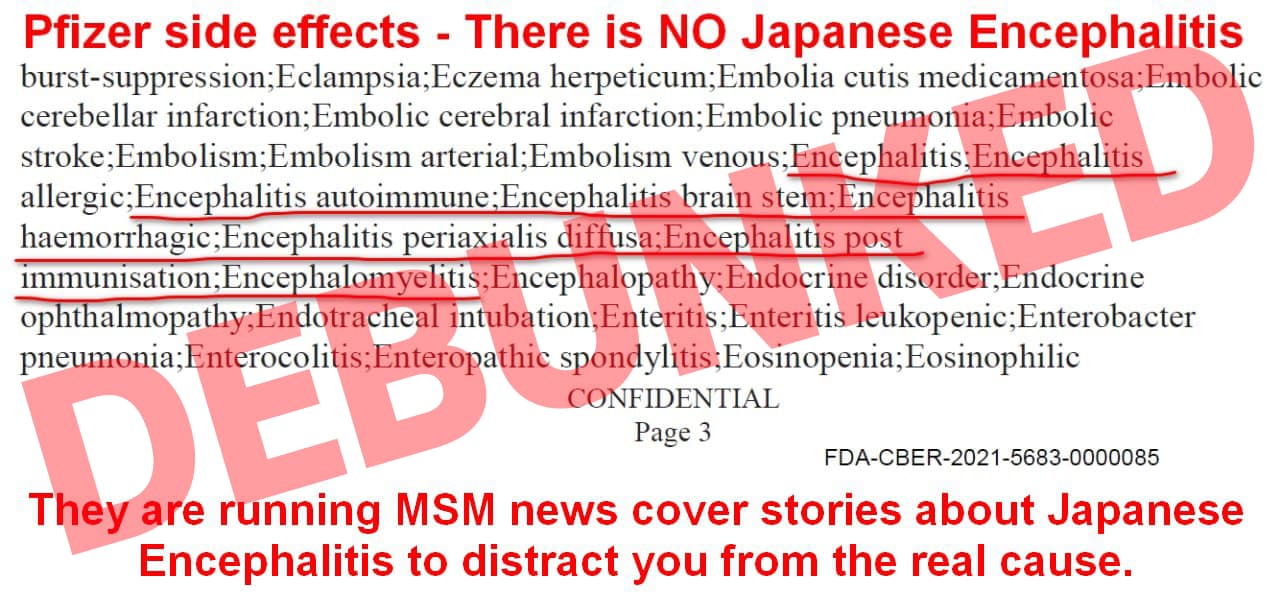
Japanese encephalitis cases are not linked to the Pfizer jab
What was claimed |
The verdict |
Reports of an outbreak of Japanese encephalitis are being used as a cover for adverse reactions to Pfizer's COVID-19 vaccine. |
False. Anti-vaxxers are incorrectly linking an outbreak of Japanese encephalitis to a Pfizer document about potential adverse events following a COVID-19 vaccination. |
By Ellen McCutchan
A Pfizer document outlining potential adverse events following vaccination for COVID-19 is again being shared online as anti-vaxxers incorrectly link the report to an Australian outbreak of Japanese encephalitis.
One claim, shared as a caption overlaid on an image of the Pfizer document, alleges that "there is NO Japanese encephalitis" and that news reports about an outbreak were "cover stories" designed to "distract you from the real cause".
 No, the Japanese encephalitis outbreak in Australia isn't a cover-up for vaccine adverse events.(Supplied)
No, the Japanese encephalitis outbreak in Australia isn't a cover-up for vaccine adverse events.(Supplied)
The Pfizer document contains a list of so-called "adverse events of special interest" (AESIs). That list includes a number of different types of encephalitis, an inflammation of the brain.
But the list of AESIs does not include Japanese encephalitis, which, as University of Queensland virologist Jody Peters told RMIT FactLab, is specifically caused by the Japanese encephalitis virus (JEV) spread via mosquitoes.
According to news reports, widespread flooding in eastern Australia had exacerbated the spread of JEV which, in rare cases, can cause serious illness and death.
In an email, Dr Peters told RMIT FactLab that Japanese encephalitis was diagnosed "through measuring antibody levels to JEV in a blood sample, or from cerebrospinal fluid".
"A person will only contract Japanese encephalitis following the bite from a Japanese encephalitis virus-infected mosquito," she wrote.
AESIs listed in the Pfizer document have not necessarily been conclusively linked to the Pfizer vaccine.
As the report itself states, the list includes "events of interest due to their association with severe COVID-19 and events of interest for vaccines in general", and incorporates pre-existing lists compiled by a number of different "expert groups and regulatory bodies".
In Australia, just seven cases of encephalitis have been reported to the Therapeutic Good Administation's Database of Adverse Event Notifications in relation to the approximately 37 million doses of the Pfizer COVID-19 vaccine administered so far.
It’s noteworthy that anyone can make an unverified report to the adverse events database and, according to the TGA, "an adverse event report does not mean that the medicine is the cause of the adverse event".
The verdictFalse. An outbreak of the mosquito-borne disease Japanese encephalitis has been exacerbated by widespread flooding in eastern Australia. Anti-vaxxers have incorrectly linked this outbreak to a Pfizer document that outlines potential adverse events following a COVID-19 vaccination. This document refers to different types of encephalitis, but not Japanese encephalitis. |


Acknowledgement of Country
RMIT University acknowledges the people of the Woi wurrung and Boon wurrung language groups of the eastern Kulin Nation on whose unceded lands we conduct the business of the University. RMIT University respectfully acknowledges their Ancestors and Elders, past and present. RMIT also acknowledges the Traditional Custodians and their Ancestors of the lands and waters across Australia where we conduct our business - Artwork 'Sentient' by Hollie Johnson, Gunaikurnai and Monero Ngarigo.
More information